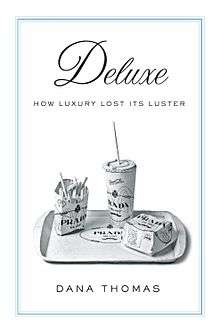Deluxe: How Luxury Lost Its Luster
 | |
| Author | Dana Thomas |
|---|---|
| Country | United States |
| Language | English |
| Subject | Luxury goods, Fashion |
| Genre | Non-fiction |
| Published | 2007 (Penguin Press) |
| Media type | Print, e-book |
| Pages | 384 pages |
| ISBN | 0-143-11370-4 |
Deluxe: How Luxury Lost Its Luster is a 2007 book by Paris-based American journalist Dana Thomas.[1] It was a New York Times bestseller.
Overview
The book examines the corporate consolidation of small family-run luxury businesses into luxury goods holding companies, and their process of "democratizing" luxury by making it available for sale to the masses in the forms of handbags, clothing, and accessories. These new luxury conglomerates—principally Kering, which owns Alexander McQueen, Balenciaga, Brioni, and Gucci; Richemont, which owns Dunhill, Cartier, Jaeger-LeCoultre, Montblanc, and Van Cleef & Arpels, and LVMH, which owns Bulgari, Dior, DKNY, Fendi, Givenchy, Marc Jacobs, Louis Vuitton, Thomas Pink, as well as De Beers, TAG Heuer, and Sephora—have achieved success with fashion shows, provocative commercials, dressing celebrities for red-carpet events, and through licensing, franchising, outlet malls, and online retailing.
Conclusions
According to Thomas, this trend has led to inferior quality, rampant outsourcing to developing nations, and a massive surge in both counterfeiting and the illicit activities it funds.[2]
References
- ↑ "Penguin Books Group". Retrieved December 28, 2010.
- ↑ Kakutani, Michiko (August 21, 2007). "The Devil Wears Hermès (He Bought It at the Caesars Palace Mall in Las Vegas)". New York Times.